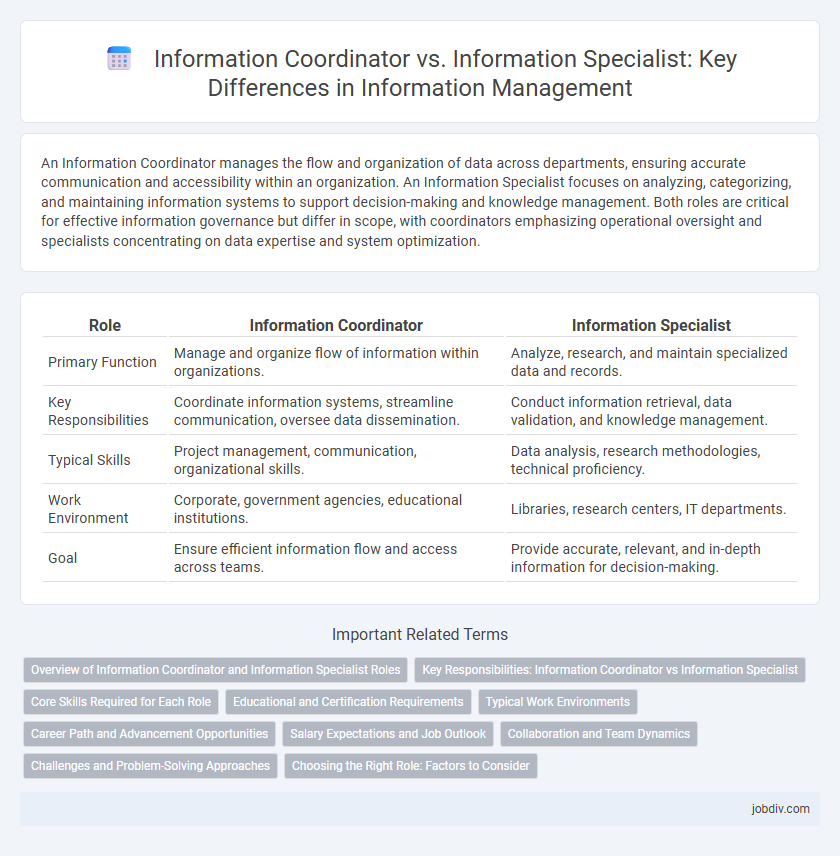An Information Coordinator manages the flow and organization of data across departments, ensuring accurate communication and accessibility within an organization. An Information Specialist focuses on analyzing, categorizing, and maintaining information systems to support decision-making and knowledge management. Both roles are critical for effective information governance but differ in scope, with coordinators emphasizing operational oversight and specialists concentrating on data expertise and system optimization.
Table of Comparison
| Role | Information Coordinator | Information Specialist |
|---|---|---|
| Primary Function | Manage and organize flow of information within organizations. | Analyze, research, and maintain specialized data and records. |
| Key Responsibilities | Coordinate information systems, streamline communication, oversee data dissemination. | Conduct information retrieval, data validation, and knowledge management. |
| Typical Skills | Project management, communication, organizational skills. | Data analysis, research methodologies, technical proficiency. |
| Work Environment | Corporate, government agencies, educational institutions. | Libraries, research centers, IT departments. |
| Goal | Ensure efficient information flow and access across teams. | Provide accurate, relevant, and in-depth information for decision-making. |
Overview of Information Coordinator and Information Specialist Roles
Information Coordinators manage the organization and dissemination of data within an organization, ensuring accurate communication flow and efficient information sharing among departments. Information Specialists focus on analyzing, retrieving, and interpreting data to support decision-making processes, often utilizing specialized software and databases. Both roles require strong communication skills and attention to detail but vary in scope, with Coordinators emphasizing coordination and Specialists emphasizing data expertise.
Key Responsibilities: Information Coordinator vs Information Specialist
Information Coordinators manage the flow of data by organizing, categorizing, and distributing information to ensure timely access for teams and stakeholders, often overseeing documentation processes and maintaining communication channels. Information Specialists focus on analyzing, interpreting, and verifying data accuracy while implementing information systems, supporting decision-making with expert data management and retrieval techniques. Their key responsibilities differ as Coordinators emphasize logistical control and information dissemination, whereas Specialists prioritize data quality, analysis, and system optimization.
Core Skills Required for Each Role
An Information Coordinator excels in project management, data organization, and effective communication to streamline information flow within teams or departments. An Information Specialist possesses strong analytical abilities, proficiency in data retrieval tools, and expertise in information systems to manage and interpret complex datasets. Core skills for an Information Coordinator emphasize coordination and collaboration, while an Information Specialist requires technical knowledge and research capabilities.
Educational and Certification Requirements
Information Coordinators typically require a bachelor's degree in information management, library science, or a related field, often supplemented by certifications such as Certified Information Professional (CIP). Information Specialists usually hold a bachelor's or master's degree in library science, information technology, or data management, with professional certifications like Microsoft Certified: Data Analyst Associate or Certified Records Manager enhancing their credentials. Both roles value continuous education and practical experience to stay current with evolving information systems and technologies.
Typical Work Environments
Information Coordinators typically work in corporate offices, government agencies, or healthcare facilities where they manage data flow and coordinate communication between departments. Information Specialists are often found in libraries, research institutions, or educational organizations, focusing on organizing, retrieving, and analyzing data to support decision-making. Both roles require proficiency in information management systems but differ in their primary workplace settings and specific job functions.
Career Path and Advancement Opportunities
An Information Coordinator typically manages data flow and communication within an organization, overseeing information distribution and ensuring accuracy, which often leads to roles in project management or administrative leadership. An Information Specialist focuses on data analysis, database management, and knowledge systems, positioning themselves for advancement into data science, IT strategy, or specialized research roles. Career paths for both roles emphasize technological proficiency and industry-specific knowledge, with advancement opportunities growing through certifications and experience in data governance and information systems.
Salary Expectations and Job Outlook
Information Coordinators typically earn a median salary ranging from $45,000 to $65,000 annually, reflecting their role in managing and organizing data processes across departments. Information Specialists often command higher salaries, averaging between $55,000 and $75,000, due to their specialized expertise in data analysis, management, and technology implementation. Job outlook for both positions shows steady growth, with Information Specialists experiencing faster demand increases driven by expanding data-driven decision-making in various industries.
Collaboration and Team Dynamics
An Information Coordinator streamlines communication and organizes data flow to enhance team efficiency, ensuring seamless collaboration across departments. In contrast, an Information Specialist focuses on managing and analyzing data to support informed decision-making within the team. Effective team dynamics rely on the Coordinator's ability to facilitate information sharing and the Specialist's expertise in providing accurate, relevant data insights.
Challenges and Problem-Solving Approaches
Information Coordinators face challenges in managing cross-departmental communication and ensuring data accuracy, requiring strategic coordination and collaboration skills. Information Specialists often encounter difficulties in data analysis and technical troubleshooting, relying on advanced analytical tools and problem-solving methodologies to address complex information issues. Both roles demand adaptability and effective problem-solving approaches tailored to their specific operational environments.
Choosing the Right Role: Factors to Consider
Choosing between an Information Coordinator and an Information Specialist involves assessing organizational needs, as coordinators focus on managing information flow and ensuring data accuracy, while specialists provide in-depth expertise and technical support with information systems. Factors to consider include the scale of information management, the complexity of data handling, and the necessity for specialized knowledge or coordination skills. Evaluating job responsibilities, qualifications, and the impact on workflow efficiency will guide the optimal role selection.
Information Coordinator vs Information Specialist Infographic

 jobdiv.com
jobdiv.com